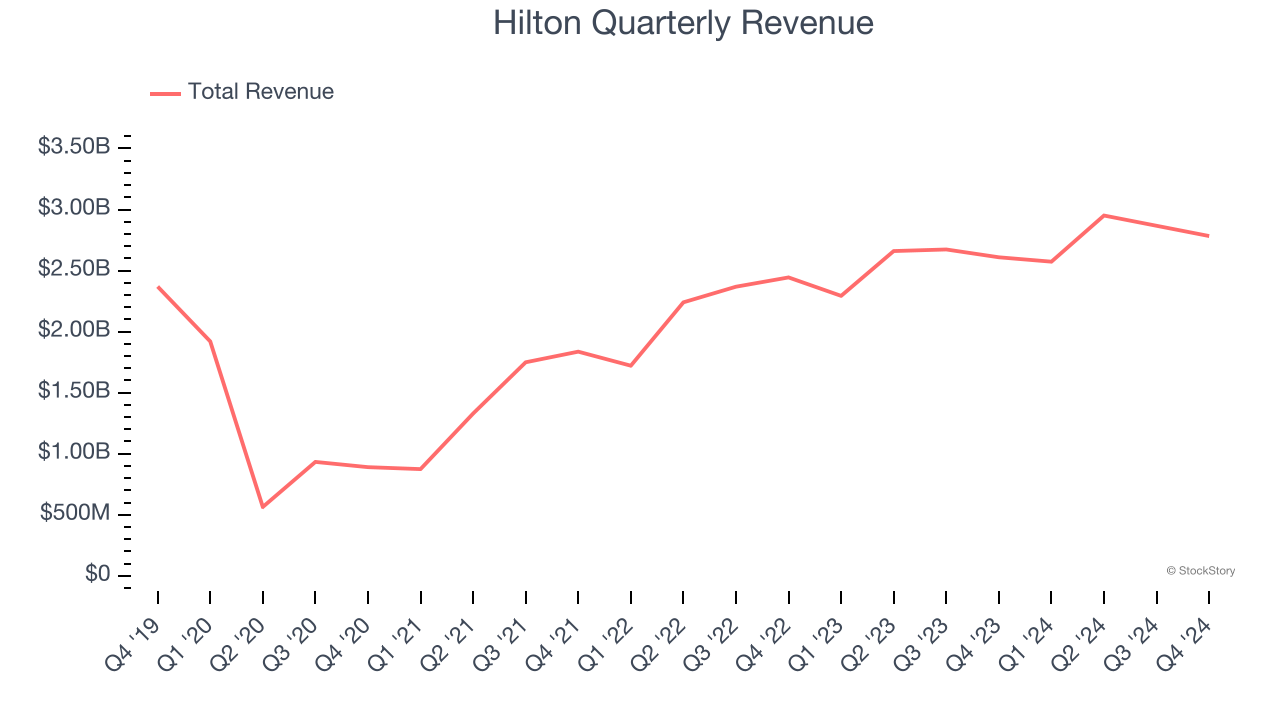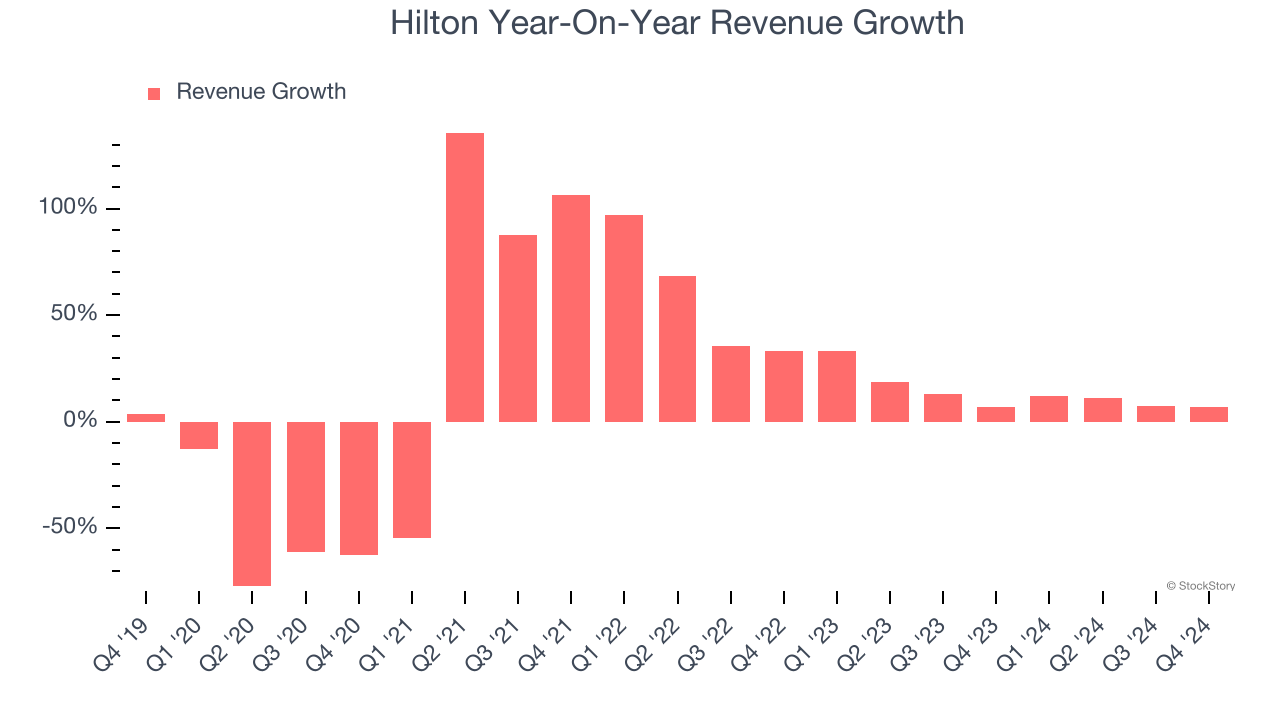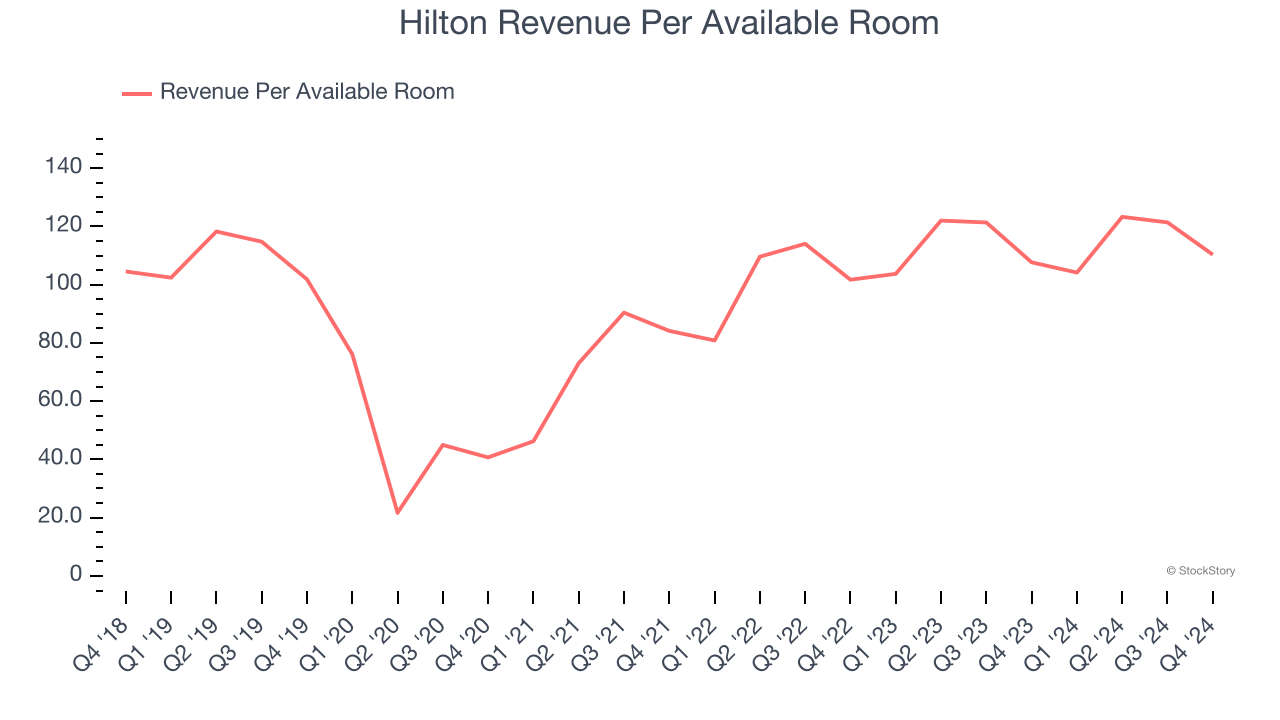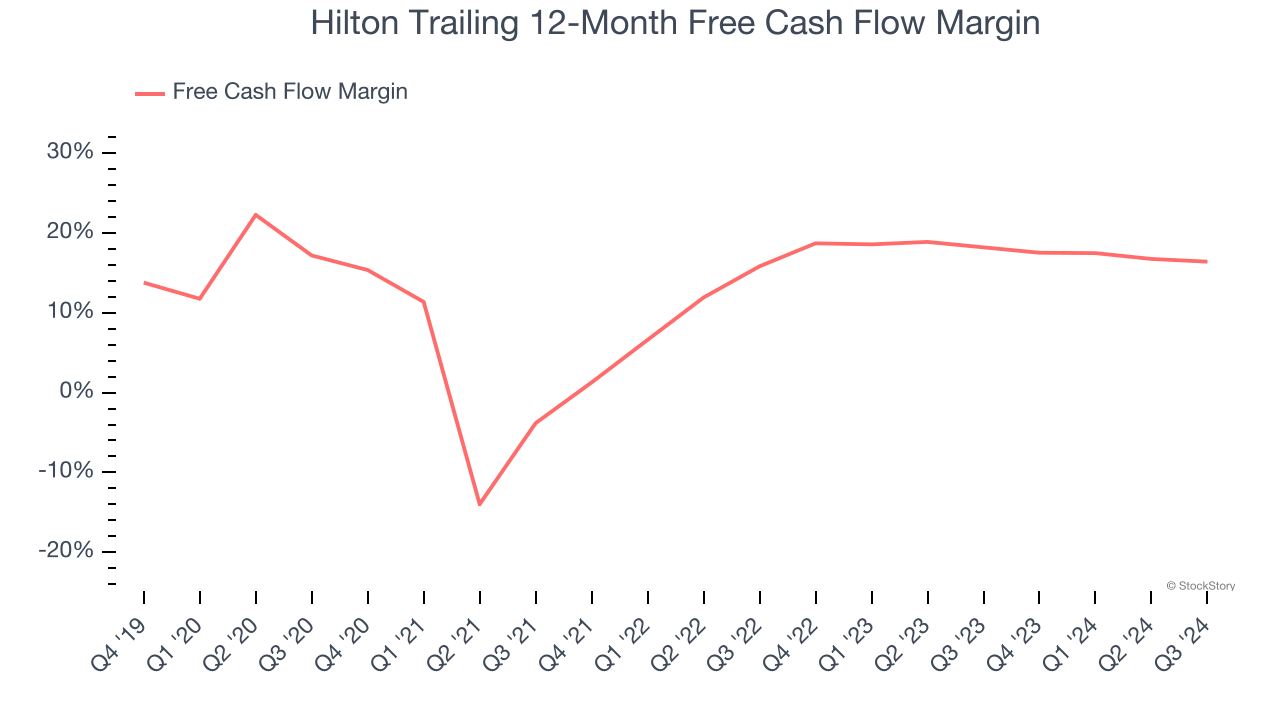
Hotel company Hilton (NYSE:HLT) met Wall Street’s revenue expectations in Q4 CY2024, with sales up 6.7% year on year to $2.78 billion. Its non-GAAP profit of $1.76 per share was 4.5% above analysts’ consensus estimates.
Is now the time to buy Hilton? Find out by accessing our full research report, it’s free.
Hilton (HLT) Q4 CY2024 Highlights:
- Revenue: $2.78 billion vs analyst estimates of $2.78 billion (6.7% year-on-year growth, in line)
- Adjusted EPS: $1.76 vs analyst estimates of $1.68 (4.5% beat)
- Adjusted EBITDA: $858 million vs analyst estimates of $830.4 million (30.8% margin, 3.3% beat)
- Adjusted EPS guidance for the upcoming financial year 2025 is $7.77 at the midpoint, missing analyst estimates by 3.1%
- EBITDA guidance for the upcoming financial year 2025 is $3.72 billion at the midpoint, above analyst estimates of $3.68 billion
- Operating Margin: 17.6%, up from 15.3% in the same quarter last year
- RevPAR: $110.33 at quarter end, up 2.5% year on year
- Market Capitalization: $62.86 billion
Christopher J. Nassetta, President & Chief Executive Officer of Hilton, said, "We are pleased to report a strong fourth quarter, with both top and bottom line results exceeding our expectations. All segments drove RevPAR outperformance, with strong trends in leisure occupancy, as well as continued growth in business transient and group results, and we expect favorable trends to continue into 2025. We also delivered the highest number of approvals, construction starts and openings in our history in 2024, helping us achieve net unit growth of 7.3 percent. With a development pipeline of nearly half a million rooms, we are confident that we are well positioned to deliver net unit growth between 6.0 percent and 7.0 percent in 2025. "
Company Overview
Founded in 1919, Hilton Worldwide (NYSE:HLT) is a global hospitality company with a portfolio of hotel brands.
Travel and Vacation Providers
Airlines, hotels, resorts, and cruise line companies often sell experiences rather than tangible products, and in the last decade-plus, consumers have slowly shifted from buying "things" (wasteful) to buying "experiences" (memorable). In addition, the internet has introduced new ways of approaching leisure and lodging such as booking homes and longer-term accommodations. Traditional airlines, hotel, resorts, and cruise line companies must innovate to stay relevant in a market rife with innovation.
Sales Growth
A company’s long-term performance is an indicator of its overall quality. While any business can experience short-term success, top-performing ones enjoy sustained growth for years. Regrettably, Hilton’s sales grew at a sluggish 3.4% compounded annual growth rate over the last five years. This was below our standard for the consumer discretionary sector and is a poor baseline for our analysis.

We at StockStory place the most emphasis on long-term growth, but within consumer discretionary, a stretched historical view may miss a company riding a successful new property or trend. Hilton’s annualized revenue growth of 12.9% over the last two years is above its five-year trend, but we were still disappointed by the results. 
Hilton also reports revenue per available room, which clocked in at $110.33 this quarter and is a key metric accounting for daily rates and occupancy levels. Over the last two years, Hilton’s revenue per room averaged 7% year-on-year growth. Because this number is lower than its revenue growth, we can see its sales from other areas like restaurants, bars, and amenities outperformed its room bookings. 
This quarter, Hilton grew its revenue by 6.7% year on year, and its $2.78 billion of revenue was in line with Wall Street’s estimates.
Looking ahead, sell-side analysts expect revenue to grow 8.3% over the next 12 months, a deceleration versus the last two years. This projection is underwhelming and suggests its products and services will face some demand challenges.
Today’s young investors won’t have read the timeless lessons in Gorilla Game: Picking Winners In High Technology because it was written more than 20 years ago when Microsoft and Apple were first establishing their supremacy. But if we apply the same principles, then enterprise software stocks leveraging their own generative AI capabilities may well be the Gorillas of the future. So, in that spirit, we are excited to present our Special Free Report on a profitable, fast-growing enterprise software stock that is already riding the automation wave and looking to catch the generative AI next.
Cash Is King
If you’ve followed StockStory for a while, you know we emphasize free cash flow. Why, you ask? We believe that in the end, cash is king, and you can’t use accounting profits to pay the bills.
Hilton has shown robust cash profitability, giving it an edge over its competitors and the ability to reinvest or return capital to investors. The company’s free cash flow margin averaged 17.1% over the last two years, quite impressive for a consumer discretionary business.

Key Takeaways from Hilton’s Q4 Results
It was encouraging to see Hilton beat analysts’ EPS expectations this quarter. We were also happy its EBITDA outperformed Wall Street’s estimates. On the other hand, its EBITDA guidance for next quarter missed. Zooming out, we think this was a mixed quarter featuring some areas of strength but also some blemishes. The stock remained flat at $259 immediately following the results.
Is Hilton an attractive investment opportunity at the current price? The latest quarter does matter, but not nearly as much as longer-term fundamentals and valuation, when deciding if the stock is a buy. We cover that in our actionable full research report which you can read here, it’s free.
